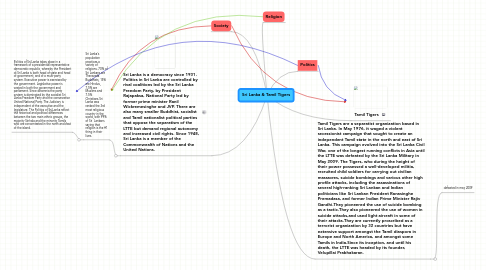Sri Lanka & Tamil Tigers
Door Natalia Cop


1. Society
2. Sri Lanka is a democracy since 1931. Politics in Sri Lanka are controlled by rival coalitions led by the Sri Lanka Freedom Party, by President Rajapaksa, National Party led by former prime minister Ranil Wickremesinghe and JVP. There are also many smaller Buddhist, socialist and Tamil nationalist political parties that oppose the separatism of the LTTE but demand regional autonomy and increased civil rights. Since 1948, Sri Lanka is a member of the Commonwealth of Nations and the United Nations.
2.1. Sri Lanka's population practices a variety of religions. 70% of Sri Lankans are Theravada Buddhists, 15% are Hindus, 7.5% are Muslims and 7.5% Christians.Sri Lanka was ranked the 3rd most religious country in the world, with 99% of Sri Lankans saying that religion is the #1 thing in their lives.
2.1.1. Politics of Sri Lanka takes place in a framework of a presidential representative democratic republic, whereby the President of Sri Lanka is both head of state and head of government, and of a multi-party system. Executive power is exercised by the government. Legislative power is vested in both the government and parliament. Since decennia the party system is dominated by the socialist Sri Lanka Freedom Party and the conservative United National Party. The Judiciary is independent of the executive and the legislature. The Politics of Sri Lanka reflect the historical and political differences between the two main ethnic groups, the majority Sinhala and the minority Tamils, who are concentrated in the north and east of the island.
